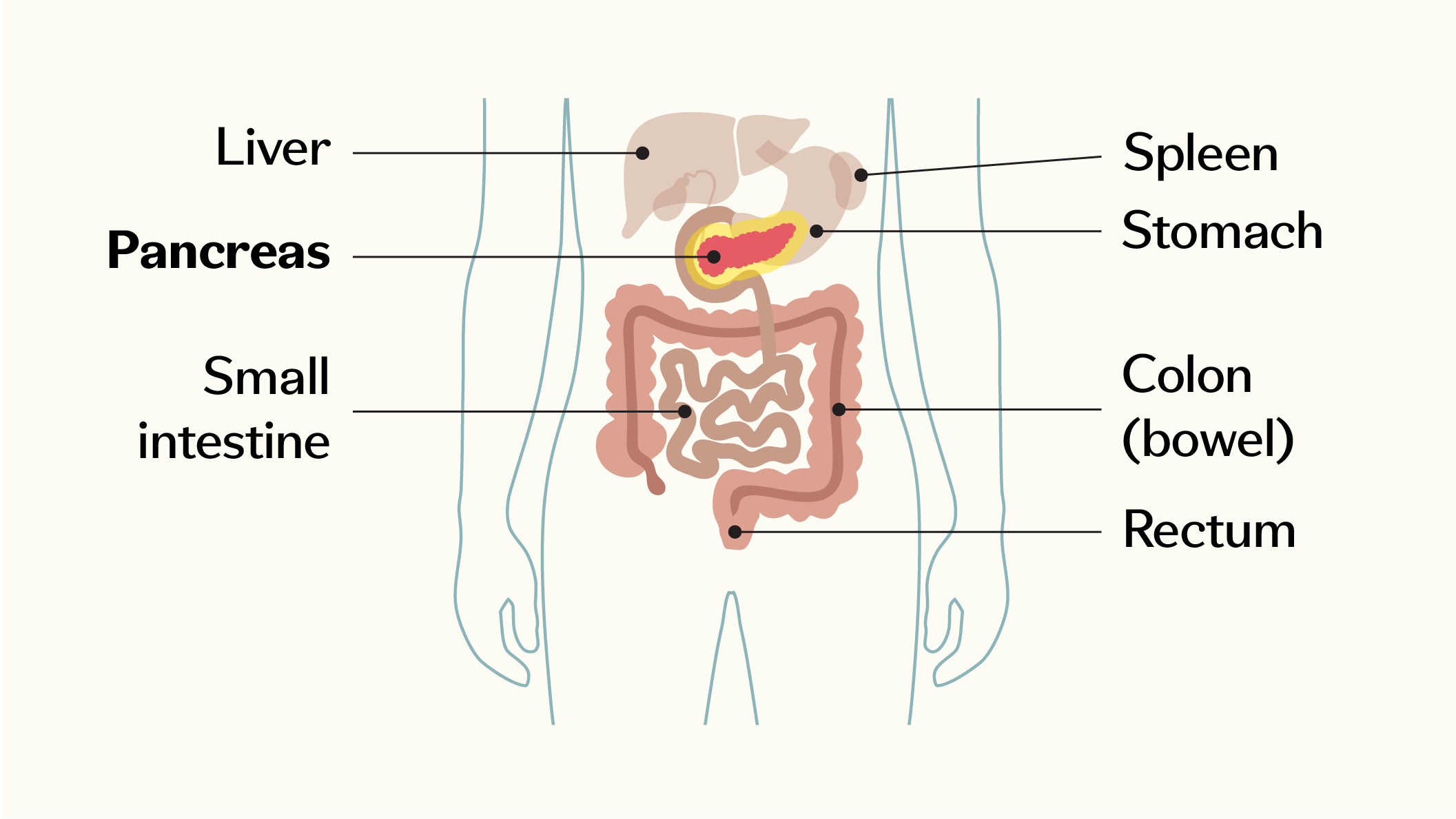The pancreas
The pancreas sits at the top of the abdomen (tummy), just behind the stomach. It helps us to digest food by making digestive juices and hormones.1

How pancreatic cancer starts
Cells are building blocks of your body.2 Pancreatic cancer happens when abnormal cells in the pancreas begin to grow and divide uncontrollably, to form a tumour.1
There are certain factors that increase the risk of getting pancreatic cancer. These include getting older, having a family history of pancreatic cancer, having previously had cancer, or having certain medical conditions. Also affecting risk are some lifestyle choices, such as smoking, drinking alcohol regularly, or following certain diets such as those high in red or processed meat. But often the reason for someone having pancreatic cancer isn’t known.3
Pancreatic cancer is the 10th most common cancer in the UK. More than 10,000 people receive a diagnosis each year.*4
*Estimate based on the average number of people diagnosed with pancreatic cancer in the UK each year between 2017 and 2019.
Type of pancreatic cancer
There are two types of cells in the pancreas and cancer can start in either of these:1
These start in exocrine cells, which make pancreatic juices and enzymes that are involved in breaking down the food we eat. This is the most common type of pancreatic cancer – more than 9 in every 10 cases (around 95%) are this type.1,5
These start in the cells that make hormones and release them into the bloodstream. Also known as neuroendocrine tumours or NETs, less than 5 in every 100 pancreatic cancers (less than 5%) are this type.1,5
Treatment options for pancreatic cancer
The exact treatment someone has for pancreatic cancer depends on a few things. These include the type of cancer (exocrine or endocrine), what stage it is (meaning how big it is and whether it has spread to another part of the body), and where in the pancreas it is found.6,7
Some of the treatments commonly used for pancreatic cancer are:6,7
- Surgery: This is sometimes possible for the few people who have their pancreatic cancer diagnosed at an early stage. Around 1-2 in every 10 people (around 10-20%) diagnosed with pancreatic cancer are diagnosed early8
- Chemotherapy: This uses anti-cancer medicines to kill the cancer cells. It is the main treatment given to many people with pancreatic cancer, especially for people whose cancer has started to spread to other parts of the body9
- Radiotherapy: This aims radiation at the cancer. It is sometimes given together with chemotherapy, and sometimes given alone to help with symptoms of advanced pancreatic cancer9,10
Remember, your healthcare team is there to support you and help you find the treatment that best suits you and your situation. You are not alone on this journey.

If you or someone you know has been diagnosed with cancer, support groups and charities are great places to find information and connect with people going through a similar experience.

Life with cancer is different for everyone. So, if you need support, it should be personal to you. ByYourSide has been created by Pfizer to offer you practical support and guidance to help you manage life with cancer in a way that is best for you.
References
- Cancer Research UK. What is pancreatic cancer? Available from: https://www.cancerresearchuk.org/about-cancer/pancreatic-cancer/about [Accessed May 2025].
- Genetic Alliance. A Guide to Genetics and Health. Washington (DC): Genetic Alliance; 2006. Why is genetics important to my family and me? Available from: https://www.ncbi.nlm.nih.gov/books/NBK115604/ [Accessed May 2025].
- Macmillan. Causes and risk factors of pancreatic cancer. Available from: https://www.macmillan.org.uk/cancer-information-and-support/pancreatic-cancer/causes-and-risk-factors-of-pancreatic-cancer [Accessed May 2025].
- Cancer Research UK. Pancreatic cancer statistics. Available from: https://www.cancerresearchuk.org/health-professional/cancer-statistics/statistics-by-cancer-type/pancreatic-cancer [Accessed May 2025].
- Pancreatic Cancer UK. What is pancreatic cancer? Available from: https://www.psgbi.org/static/uploads/resources/what-is-pancreatic-cancer-final-download-fact-sheet.pdf [Accessed May 2025].
- Macmillan. Treatment for pancreatic cancer. Available from: https://www.macmillan.org.uk/cancer-information-and-support/pancreatic-cancer/treatment-for-pancreatic-cancer [Accessed May 2025].
- [1] National Health Service. Treatment for pancreatic cancer. Available from: https://www.nhs.uk/conditions/pancreatic-cancer/treatment/ [Accessed May 2025].
- Pancreatic Cancer UK. Surgery for operable pancreatic cancer. Available from: https://www.psgbi.org/static/uploads/resources/surgery-for-operable-jan-2015-for-web.pdf [Accessed Mayr 2025].
- National Health Service. Chemotherapy. Available from: https://www.nhs.uk/conditions/chemotherapy/ [Accessed May 2025].
- National Health Service. Radiotherapy overview. Available from: https://www.nhs.uk/conditions/radiotherapy/ [Accessed May 2025].
